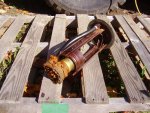Badfish740
Member
- 34
- 2
- 6
- Location
- New Jersey
I am looking to purchase an M35 sometime in the next couple of years and one of the things that has always intrigued me about military trucks is their multifuel engines. I am in the process of trying to learn as much about them as I can, but I'd like to hear from people who have been running their trucks on WVO for long periods of time (ie: years) and what has worked and what hasn't. I am not new to this-I converted my 2003 F-350 Powerstroke (7.3L) to run on WVO via a Biofuels Technologies two tank heated system. I had a 60 gallon toolbox tank in the bed which had a heated pickup that fed fuel to heated manifold where the fuel was then sent to the ports at the rear of each head and into the injectors. Switchover for startup and shutdown (purging) was all handled by the PCM of the system, no user input required. This ensured that the truck was only burning 160° WVO once the engine itself was fully warmed up, and that upon shutdown, the truck would run for 90 seconds to fully flush the lines with diesel. It was a great system and a great truck-the only reason I sold it all was because I needed money for other things once my daughter was born. We drove from New Jersey to Maine and back many times for free, not to mention I commuted 80 miles roundtrip to work each day using only about a pint of diesel for startup and shut down each day.
I never had a problem with my truck in the six years I owned it and the current owner is still using it on his farm, but part of that is because the two tank heated automatic system is foolproof. I never had to worry about remembering to switch over or purge, and I never had to worry about a blend separating in cold weather. That said, I'm curious about the capabilities of these engines. There might be a way to convert the Biofuels system to work with the M35 engine, which I'm looking into, but I'd like to hear from folks who have experimented with blends, line heaters, and other methods to run WVO as fuel and what has worked/not worked long term. Line heaters and preheating devices can be cumbersome to work with, but I'd be willing to try it since this is a unique situation. With my F-350, that was my daily driver-I needed it to start and run every day normally without fail, so I went with the fully automatic system. It's not like I'll be driving the M35 every day, but it will be operating in extremely cold weather (Maine), so I will need a way to ensure trouble free operation even during periods of -30° F temperatures. Looking forward to hearing from folks about what has worked for them with these engines.
I never had a problem with my truck in the six years I owned it and the current owner is still using it on his farm, but part of that is because the two tank heated automatic system is foolproof. I never had to worry about remembering to switch over or purge, and I never had to worry about a blend separating in cold weather. That said, I'm curious about the capabilities of these engines. There might be a way to convert the Biofuels system to work with the M35 engine, which I'm looking into, but I'd like to hear from folks who have experimented with blends, line heaters, and other methods to run WVO as fuel and what has worked/not worked long term. Line heaters and preheating devices can be cumbersome to work with, but I'd be willing to try it since this is a unique situation. With my F-350, that was my daily driver-I needed it to start and run every day normally without fail, so I went with the fully automatic system. It's not like I'll be driving the M35 every day, but it will be operating in extremely cold weather (Maine), so I will need a way to ensure trouble free operation even during periods of -30° F temperatures. Looking forward to hearing from folks about what has worked for them with these engines.


